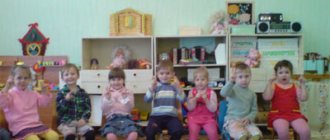Article:
In recent years, there has been an increase in the number of preschool children with disorders of general and speech development, and, consequently, the number of children entering correctional kindergartens is also growing.
Most of them have not only a complex speech defect, but also difficulties in behavior, as well as underdevelopment of the intellectual-cognitive sphere and are subject to enrollment in a special speech group in a compensatory kindergarten. Working in the field of correctional education, we noted that the work of a teacher-psychologist in a compensatory kindergarten is complicated by many unresolved problems: the lack of uniform normative and program-methodological materials, the difficulties of organizing interaction with other participants in the educational process as equal partners in correctional speech intervention for children. Therefore, it is necessary to talk about the specifics of the organizational, methodological and advisory activities of a teacher-psychologist in a compensatory kindergarten. The goal of a psychologist, as a specialist in the field of counseling and diagnostics of mentally healthy people, is to help identify problems that cause discomfort in life, help in finding true life goals and objectives, help in finding resources to solve certain problems, support.
The main tasks of a child psychologist are the preservation of the mental, somatic and social well-being of pupils in the process of education and training, the emotional, personal and cognitive development of children; these tasks are solved both through communication with the adult environment, that is, with teachers and parents, and directly in work with children. Work with children is carried out both in groups and individually. The main audience - the main “clients” of the psychologist in this educational institution are preschool children and their immediate environment.
The main principle of organizing the work is to provide comprehensive psychological and pedagogical assistance to children with speech disorders. A teacher-psychologist, together with a speech therapist, has the opportunity to provide assistance to both each child and a group of children with speech defects: monitor the development process; engage in deep and comprehensive preventive, correctional and developmental work with children of a certain age; provide individual support to those who need it. In addition, with joint activities, it becomes possible to carry out methodological work and develop projects that have an impact on the educational environment of the preschool institution as a whole.
The main tasks of the work of a teacher-psychologist in a compensatory kindergarten include:
creation of an environment of psychological support for children with speech disorders,
development of memory, attention, thinking, spatial orientation,
improvement of fine motor skills, development of auditory attention and phonemic hearing, development of hand-eye coordination,
development of volition and self-control skills, volitional qualities, activation of practiced vocabulary, relieving anxiety in children with a negative attitude towards speech therapy classes,
ensuring psychological readiness for schooling,
increasing the psychological culture of parents and teachers.
The goals of psychological work in a speech therapy kindergarten come down to social adaptation and integration of a child with a speech disorder into the environment of normally developing peers. The activities of a psychologist include comprehensive psychological support for children in the educational process. The realization of these goals is possible only with close interaction between these specialists in the development (correction) of speech and non-speech mental processes and functions. The activities of a psychologist in a speech therapy kindergarten are also aimed at the development of cognitive processes directly related to speech.
The primary influence on speech development is the family, these are the child’s parents. General objectives are primarily aimed at providing timely diagnostic, preventive and correctional speech therapy assistance to children with speech disorders and their parents.
At first, as a “young specialist” psychologist, I was very struck by the undisguised surprise with which a parent told me during a consultation: “Why are children not born with the ability to play?” And only then, having learned a little about cynicism, I begin to explain to myself the behavior and ignorance of their parents. And when I regularly encounter this, I understand that one cannot indulge the parents’ reluctance to get to know their child. Yes, parents don’t have time to educate themselves, yes, they have a very important job, and they are very busy, but this does not change the essence of the problem - parents need to be taught to educate their children. Because they are responsible for this little life, because they are “the first teachers for their child.”
We can safely say that today's parents are “money-making machines”, concerned about the growth of their income, and their interest in the development of their children of today (that is, their future of tomorrow) is negligible. School, of course, is important for its greater pedagogy and contribution to the child’s education, but only the seed that is planted in children’s preschool souls today will grow tomorrow (at school).
That is why we proposed training work with parents to get to know the child. And the number of parents starting to attend our classes has surprisingly increased. At the trainings, parents became familiar with various approaches to raising children and actively expressed their opinions. The opinions were quite interesting, given the “diversity” in the levels of education and education of parents.
The presented model of the work of a teacher-psychologist in a speech therapy preschool educational institution allows, firstly, to take into account not only the speech, but also the individual typological characteristics of children, as well as their compensatory capabilities; secondly, clearly formulate an objective conclusion and, thirdly, outline individual and group programs of correctional work for the long term. However, we should not forget that the coordination of the actions of a teacher-psychologist and a speech therapist teacher, as well as parents in a preschool institution, makes it possible to effectively correct existing speech development disorders, which helps the child easily adapt to the preschool environment, develop and learn successfully.
List of used and recommended literature
1. Arefieva Z.A., Podobed S.O. Organization of the work of a speech therapy center in a preschool educational institution // Speech therapist. 2004. No. 6. P. 50-59.
2. Organizational and content models of a psychologist’s activity // School psychologist. 2003. No. 32.
3. Stepanova O.A. Main directions for optimizing the correctional educational process in preschool educational institutions (groups) for children with speech disorders // Speech therapist. 2004. No. 4. P. 4-13.
4. Stepanova O.A. Organization of psychological and speech therapy work in a preschool educational institution. M., 2007







